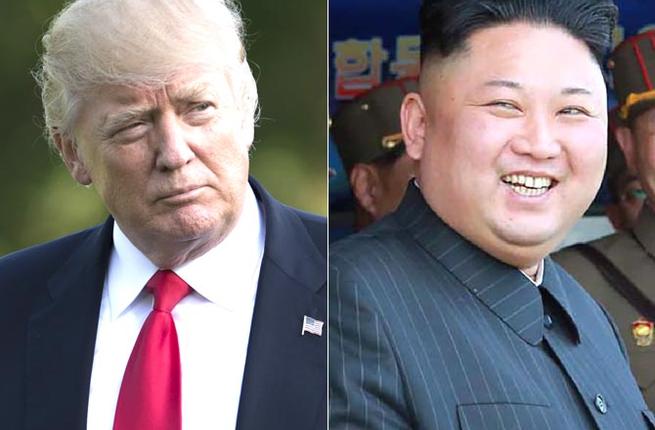North Korea threatened Wednesday to cancel the forthcoming summit between leader Kim Jong-Un and President Donald J. Trump, accusing the US administration of trying to force it “into a corner” on unilateral nuclear disarmament.
In an angrily worded statement, Pyongyang insisted it would abandon the high-level meeting, set for June 12, if Washington sought to pressure it into giving up its atomic arsenal.
“If the U.S. is trying to drive us into a corner to force our unilateral nuclear abandonment, we will no longer be interested in such dialogue,” first vice foreign minister Kim Kye-Gwan said in a statement carried by state media.
In that case, he added, Pyongyang would have to “reconsider” its participation at next month’s summit in Singapore.
Wrong to simply describe NK’s latest statements as a “return to form”. It also reflects unrealistic US hopes/demands that NK agree to a demanding definition of denuclearization as a first step. All or nothing approach to diplomacy will likely yield nothing https://t.co/2w5V1YGZpq
— Richard N. Haass (@RichardHaass) May 16, 2018
The North’s weaponry is expected to be top of the agenda at the historic talks, but Pyongyang has long insisted it needs the weapons to defend itself against invasion by the U.S.
Kim tore into Trump’s National Security Adviser John Bolton for drawing parallels between North Korea and Libya. After giving up his atomic programme, Libyan leader Moamer Khadafi was killed in an uprising backed by NATO bombing.
“It is absolutely absurd to dare compare the DPRK, a nuclear weapon state, to Libya which had been at the initial stage of nuclear development,” he said, using the initials of North Korea’s official name. “We shed light on the quality of Bolton already in the past, and we do not hide our feeling of repugnance towards him.”
Washington is pressing for its complete, verifiable and irreversible denuclearisation. But so far the North has not given any public indication of what concessions it is offering, beyond euphemistic commitments to denuclearisation of the “Korean peninsula.”
Pyongyang had “made clear on several occasions that precondition for denuclearisation is to put an end to anti-DPRK hostile policy and nuclear threats and blackmail of the United States,” minister Kim said.
In the past, Pyongyang has demanded the withdrawal of U.S. troops stationed in the South, and an end to Washington’s nuclear umbrella over its security ally.
Minister Kim also dismissed offers by U.S. Secretary of State Mike Pompeo for U.S. economic aid if the North denuclearises.
“We have never had any expectation of U.S. support in carrying out our economic construction and will not at all make such a deal in future,” he said.
Tightrope Diplomacy
In recent weeks, as well as an eye-catching summit with the South’s leader last month in the Demilitarized Zone, Kim has twice met Chinese President Xi Jinping and Pyongyang has announced it will destroy its nuclear testing site next week.
China, North Korea’s sole major ally, on Wednesday expressed “hope” the meeting would still go ahead. Analysts said Pyongyang appeared to be trying to redefine the terms of the debate.
“It’s a diplomatic tactic,” Kim Hyun-wook, professor at the Korea National Diplomatic Academy, told AFP, calling it “brinkmanship to change the U.S. position”.
“It looks like Kim Jong-Un was pushed into accepting US demands for ‘denuclearisation-first’ but is now trying to change its position after normalising North Korea-China relations and securing economic assistance,” he added. “The classic North Korean tightrope diplomacy between the US and China has begun.”
U.S. officials have repeatedly claimed credit for Washington’s “maximum pressure” policy for bringing Pyongyang to the negotiating table.
Joshua Pollack of the Middlebury Institute for International Studies said Pyongyang had been irritated by the “triumphalist tone.”
“The North Koreans aren’t happy with what they’re seeing and hearing,” he said. “There is still a yawning gulf between expectations for diplomacy in Pyongyang and Washington, DC.”
Thunderstruck
KCNA also denounced the Max Thunder joint military exercises being held between the US and South Korea as a “rude and wicked provocation”, and Seoul said it had received a message cancelling planned high-level talks “indefinitely.”
The two-week drills started last Friday and involves some 100 aircraft from the two allies, including F-22 stealth fighter jets.
Pyongyang’s move was “regrettable”, said unification ministry spokesman Baik Tae-hyun, adding it “contradicts the fundamental spirit and purpose of the Panmunjom Declaration.”
Hostilities in the 1950-53 Korean War stopped with a ceasefire, leaving the two halves of the peninsula divided by the Demilitarized Zone (DMZ) and still technically at war.
The North has spent decades developing its nuclear arsenal and missiles capable of reaching the US, earning itself multiple rounds of U.N. Security Council resolutions, while Trump and Kim traded personal insults and threats of war last year.
Relations underwent a sudden turnaround as Moon used February’s Winter Olympics in the South to broker talks between Washington and Pyongyang.
Washington said it will continue to plan next month’s meeting, with State Department spokeswoman Heather Nauert telling reporters it had received “no notification” of a position change by North Korea. The exercises were “not provocative” and would continue, she added.
"This is something that we fully expected," said @PressSec this morning of North Korea threat to scrub summit with Pres Trump. "If they want to meet we’ll be ready and if they don’t, that’s okay too," said Sanders, in a WH driveway gaggle with reporters. pic.twitter.com/xDYXV5dQ2F
— Mark Knoller (@markknoller) May 16, 2018
White House spokeswoman Sarah Sanders said Wednesday Washington is “still hopeful” the summit between Kim and Trump will proceed.
“We’re still hopeful that the meeting will take place and we’ll continue down that path,” Sanders told Fox News. “At the same time … we’ve been prepared that these might be tough negotiations.”
“The president is ready if the meeting takes place. And if it doesn’t, we will continue the maximum pressure campaign that has been ongoing.”
Going Anti-American to Go Pro-American: North Korea’s Nuclear Agenda




















